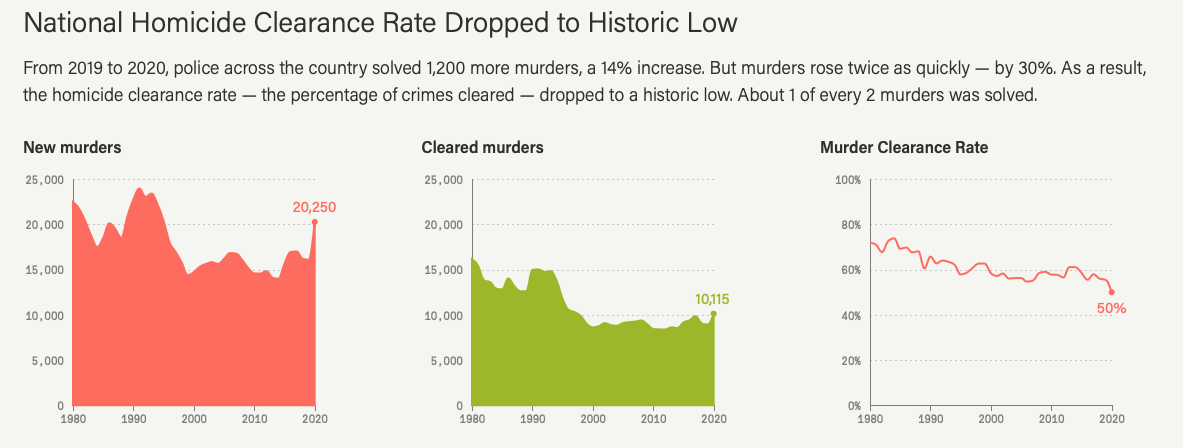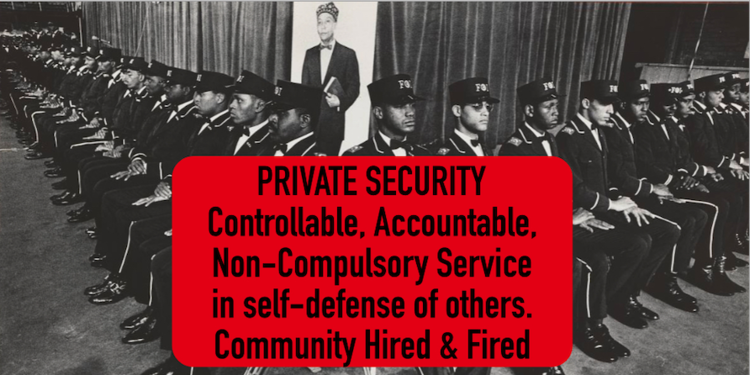Record Low Homicide Clearance Rates are Proof Police Don't Prevent/Solve Murders. Could Police be Replaced w/Accountable, Controllable Servants who are Hirable/Fireable by Citizens? [Private Security]
/From [HERE] In 2020 the reported rate at which killings were solved, known as the “clearance rate,” declined to a little below 50%.
The lower clearance rate in 2020 was an extension of a long, steady drop since the early 1980s, when police cleared about 70% of all homicides, and a decline that experts say was exacerbated by the pandemic. (The FBI won’t release 2021 numbers until later this year.)
In most cases, clearing a crime means at least one suspect was arrested and charged with the crime. However, individual agencies have different ways of calculating clearance, with some clearing a case once police identify a suspect, and others if an arrest is made.
At the national level, the FBI uses blunt math to calculate a clearance rate, dividing the number of crimes that were cleared — no matter which year the crime occurred — by the number of new crimes in the calendar year. By clearing old and new cases, a department’s rate in any given year could exceed 100%. This leaves the numbers prone to statistical “noise,” but they can be useful for examining trends over the long term.
Clearance has long been the primary metric that law enforcement agencies use to assess their effectiveness at solving crime. Low or declining clearance rates often lead to increased political pressure on police leadership, and calls for more hiring or funding.
For police to “clear” a crime, they usually need to identify and arrest the suspect. But according to more granular data collected by the FBI but reported by fewer agencies, at least 400 murders cleared in 2020 were solved by “exceptional means.” That means police believed they had enough evidence, but were unable to make an arrest. This occurs when the suspect has died, can’t be extradited or if prosecutors refuse to press charges. Critics say police use clearance by exceptional means — sometimes colloquially described as putting “bodies on bodies” — to artificially inflate clearance numbers. [MORE]
In reality “Defund the Police” was nothing ever more than a message on a sign, let alone being an actual crafted policy proposed to “legistraitors.” At best it is an ill conceived plan to somehow stop police brutality by giving the police smaller budgets. But having less money can have no effect on the granfalloon of “authority” or the right to forcibly control others. Police with small budgets in poor countries have no problem brutalizing citizens when they deem it necessary to do so. As such, “defund the police” was a reactionary slogan on sign that reflects real anger in the street about police authority and master servant relations between citizens and police.
The real threat to elites from “defund the police” is the fact that police services provided by the government can be summarily replaced by private security. Rather than reducing tax dollars budgeted to cops as a remedy to somehow stop police brutality, “Defund the police” or replacing police could simply mean community hired and fired trained security workers who have a contractual duty to aid people in peril and a natural right to come to the defense of others but who have no right to initiate unprovoked acts of violence on people. Therefore, there would be no need for a police department.
Security workers have the same rights that people have because all persons have the natural right to defend themselves and come to the defense of others if they believe the other person is in imminent danger from an aggressor. However, in the US legal system people have no general legal duty to rescue or aid other people in danger. Thus, security workers can be contractually obliged to aid people in peril and could be held accountable directly to the people who hire and fire them.
An essential difference between private security workers and police officers is that security workers possess no government authority or right to initiate unprovoked acts of violence on other people. Unprovoked violence against others or the use of “force” is the basis of all social evils and can only be used in the sense of attack not defense. As explained in FUNKTIONARY, “Unfortunately, governments only function by force. Once established, they put laws into effect by threatening persecution, imprisonment, fine, or death against all who don't comply with those laws--including the use of the force continuum.” [MORE]
If a “public servant," such as a police officer, is uncontrollable, unaccountable, can’t be hired or fired by you, has irresponsible power over you and provides a compulsory “service” then he is actually your Master. Lysander Spooner, stated “It is of no importance that I appointed him, and put all power in his hands. If I made him uncontrollable by me, and irresponsible to me, he is no longer my servant, agent, attorney, or representative. If I gave him absolute, irresponsible power over my property, I gave him the property. If I gave him absolute, irresponsible power over myself, I made him my master, and gave myself to him as a slave. And it is of no importance whether I called him master or servant, agent or owner. The only question is, what power did I put into his hands? Was it an absolute and irresponsible one? or a limited and responsible one?”
How did politicians and public servants acquire such powers? [MORE]







































































































































































































































































